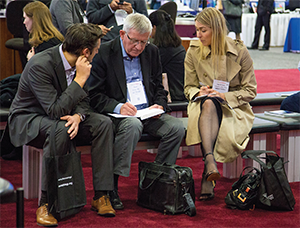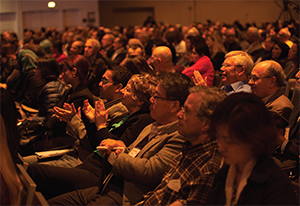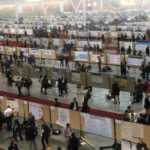
The Exhibit Hall is a good place for attendees to network

Attendees are always engaged during the Thieves’ Market: Show Me Your Best Cases session.
Attendees looking for sessions that may challenge their current perspectives on disease treatment in a given area may want to attend The Great Debate or Thieves’ Market: Show Me Your Best Cases. This year, Paul Emery, MD, University of Leeds, Chapel Allerton Hospital in the United Kingdom, and Dr. Kavanaugh will debate the topic of To Taper or Not to Taper?—Biologic DMARDs in Low Rheumatoid Arthritis Disease Activity. The top six Thieves’ Market cases will be selected from submissions by rheumatologists from around the world. Both sessions use audience response systems that will allow participants to see how their responses line up with those of their colleagues.
Lastly, if you’re looking for a fun way to challenge your basic knowledge of rheumatology over a wide range of topics, plan to attend the Knowledge Bowl, both the preliminary and final rounds. These sessions pit teams of rheumatology fellows against each other in a Jeopardy! game show-styled trivia competition. The energy in this session is typically palpable.
TechMed Sessions
To stay abreast of technological advances and how you can use technology to improve your practice, consider attending TechMed sessions, which range from topics on social media to data registry. Currently, at least nine sessions are planned and cover a variety of topics, including Smart Office, Smart Home: Adaptations for Rheumatic Disease; Hot Topics in Teaching Techniques: Flipped Classroom, Technology and Reflection; and the Workshop session, Optimizing the Electronic Health Record for Maximizing Productivity in the Rheumatology Clinic.
The Annual Meeting Planning Committee is most excited about piloting the new Flipped Classroom series. These sessions feature a learning format that incorporates both independent study and hands-on training. In short, participants are expected to do homework, such as watching online video lessons or tutorials, working on projects and taking short quizzes, before attending the class. Then, class time is dedicated to discussion and exercises designed to enforce and enhance what pupils learned on their own. The ACR is piloting this educational format for the first time and hopes participants find this type of learning experience to be more personal and valuable.
A Flipped Classroom series titled Digital Scholar Training Series will include two sessions in which rheumatologists can learn from patients’ online conversations and the dos and don’ts of communicating with patients online. This series is for attendees who want to learn how to engage patients in open and honest conversations.

